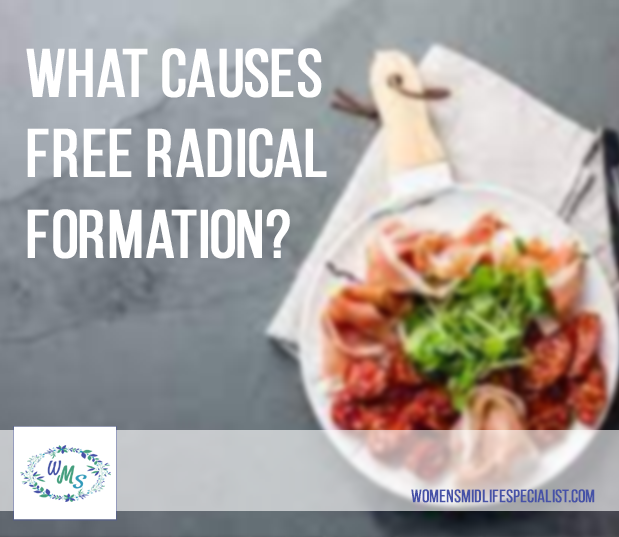What Causes Free Radical Formation?

Free Radicals form in our cells both internally and externally.
Internal sources simply mean occurring directly within the body’s cell and tissues, whereas external sources mean they are introduced into the body through our environment. External Sources – that which you are more likely to have control over (but not always like Air pollution, Leaky Gut, Processed Foods, Drugs and Alcohol to name a few.
In the body, free radicals cause similar deterioration, as they destroy cell membranes and make cells vulnerable to decay and pathogens. These free radicals damage DNA and mitochondria, the basic building blocks of all tissues, and leave in their path many health problems.
Antioxidants are found in a variety of plants in the form of vitamins A, C and E, selenium and certain phytonutrients and polyphenols
Internal Free Radical Sources occur through normal bodily functions.
1. Metabolism, or energy production, within the cells. Most of the oxygen we breathe is used to produce energy. However, there is a small amount that is left over which losses electrons creating free radicals.
You do not have any control over this except to assure that your body has adequate anti-oxidants to overcome the free radicals produced during this normal metabolic process. A healthy diet should be enough for this type of free radical production.
2. Metabolism of fat, carbohydrates and proteins. Again, non negotiable. It is a bodily function, and free radicals are produced in normal bodily functions.
3. Low blood supply or lack of oxygen.
- Asthma exacerbations or other lung diseases
- Heart attacks and strokes
- Uncontrolled blood pressure (causes lack of oxygen to the smallest vessels in the body which are located in the brain, behind the eye and in the blood vessels most distal, (or farthest away from), your heart.
- Anemia or other blood disease which impairs the transport of oxygen and nutrients to all of the body.
How to RID your Body of FREE RADICALS?
Eat foods rich in antioxidants, chemicals that inhibit the oxidation of molecules by neutralizing free radicals, thereby stopping them from causing cellular damage.
External Sources – that which you are more likely to have control over (but not always.)
1. Air pollution
2. Smoking
3. AGE (Advanced Glycogen End Products), from charbroiling
4. Processed foods
5. Elevated blood sugars
6. Ozone depletion
7. Drugs – prescription and recreational
8. Excess alcohol
9. Trans fatty acids
10. Spoiled foods
11. Infections
12. Air pollutants
13. Allergies – both immediate and delayed
14. Leaky gut
15. Daily stress
16. Excessive or over-exercising
17. Toxic chemicals and pesticides (don’t forget cleaning supplies)
18. Petroleum based products
19. Toxic products found in furniture polish and paints – e.g., toluene, benzene and formaldehyde
20. PCBs - polychlorinated biphenyls – causes disturbances to the Neuro-Endo-Immune System (neurotoxic, immunotoxic and hormonal disruptors.)
21. Radiation from the sun overexposure to sunlight and prolonged exposure to x-rays.
22. Heavy metals - All transition metals with the exception of copper, contains one electron in their outermost shell and can be considered a free radical. Copper, although having a full outer shell of 2 electrons, loses its electron easily and can be considered a free radical too. The following metals are, however, major free radicals creating agents in the body - mercury; calcium; aluminum; lead; chlorine; iron; cadmium.
You can avoid sources of free radicals by incorporating healthy foods. Keep in mind that free radical content is high in nutrient-poor meals and those deficient of antioxidants.
- Avoid high glycemic foods, or foods that are rich in refined carbohydrates and sugars. They are more likely to generate free radicals.
- Limit processed meats such as sausages, bacon and salami. They contain preservatives, which leads to the production of free radicals.
- Limit red meat. It is particularly more vulnerable to oxidation because of its high iron content.
- Don't reuse cooking fats and oils. Heating fats and oils during cooking oxidizes them, generating free radicals which seep into our foods.
- Limit alcohol. Alcoholic drinks not only are high in calories but also can produce free radicals in the body. Try to limit your drinks to one or two per day.
- Eat foods rich in antioxidants, chemicals that inhibit the oxidation of molecules by neutralizing free radicals, thereby stopping them from causing cellular damage. Antioxidants are found in a variety of plants in the form of vitamins A, C and E, selenium and certain phytonutrients and polyphenols. Cranberries are loaded with them!
- Look for foods with β-carotene, lycopene and lutein, including broccoli flowers, alfalfa sprouts, Brussels sprouts, carrots, collard greens, corn, mango and tomatoes. These foods can be incorporated into several side dishes such as vegetable medleys, casseroles and salads.
- Consider fruit for dessert instead of rich pies and cakes. Apples, cantaloupe, cherries, grapefruit, kiwi, papaya, red grapes, blackberries, raspberries and strawberries are delightful on their own or when mixed to create lovely fruit salads.
- Grab some nuts – always plentiful at the holidays – and other foods rich in vitamin E, such as sweet potatoes.
- Plant metabolites called flavonoids also demonstrate antioxidant functions. Some versatile antioxidant-rich flavonoids include onions, eggplant, lettuce, turnip greens, endives, pears, red wine, parsley, citrus fruits, berries, cherries, plums, legumes, soybeans, milk, cheese, tofu and miso.
- Enjoy antioxidant superfoods, those with high levels of more than one vitamin. These are prunes, plums, raisins, blueberries, cranberries, figs, oranges, pomegranates, sweet red bell peppers, beets, kale, spinach and dark chocolate.
- Try herbal therapy – in your food! Many spices can not only enhance the flavor of our holiday turkeys and hams but also reduce oxidative stress. These include ginger, grape seed extract, ginkgo, rosemary and turmeric.
- Take time for tea. When the evening comes to an end, you can revel in a gentle and soothing cup of warm green tea and be comforted in knowing that the polyphenols in your brew also combat oxidation.


Leave a comment